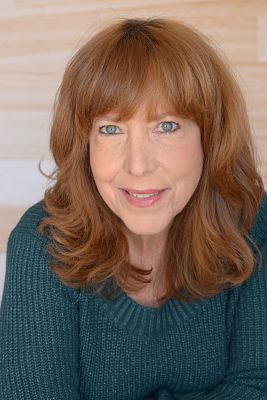It’s All Uphill (Unless It’s Downhill) From Here
When I graduated from University of California, Irvine in 1980, with a BFA in theatre, I didn’t stick around for the commencement speech. The day of my last class was the same day I boarded a plane and flew back to New York. I hadn’t been in Southern California by choice. Six years had gone by since my aerospace engineer father lost his job on the east coast and found one out west. I was about to start high school when my life was interrupted. I had vowed to get back to New York as soon as I possibly could.
In New York, I began to pursue my creative passions. I wrote plays, auditioned, and co-founded a theatre company. Sustaining those pursuits, however, became a challenge. It wasn’t long before my part-time ad agency job went fuller-than-full-time. In 1990, I was asked to open the agency’s first satellite office—in Los Angeles. I said no. But my actor boyfriend was interested in the career possibilities, and agreed to go to L.A. with me if I went. I said maybe. The reality was, since going the steady paycheck route, I wasn’t really getting much acting or writing done. So, against my better judgement, I agreed to give the west coast another try. Maybe if I was 3,000 miles away from the agency’s main office, I could squeeze in some creative time.
In L.A., I signed up for a weekend workshop on personal branding for actors—the basic premise being that we all have an essence that informs how others perceive us, and, before we ever say a word, our essence projects more about us than we realize. The sooner we understand that, the sooner we can get comfortable in our own skin and leverage our strengths. Self-awareness goes a long way, but we don’t get there alone.
After a series of exercises, my seven classmates and I tried our best to capture each others’ essences, and synthesize our findings into slogan-like statements. I was excited to hear what they came up with for me. Until I wasn’t.
“The truth is Sisyphus loves the rock,” my classmate read aloud.
There was a lot of head nodding and smiling.
“Yes, definitely,” the others said. “That really fits.”
I tried to mask my reaction with a question that would be read as thoughtful and not disappointed: “He’s the guy who has to keep rolling a boulder up a hill, even though it just rolls down again?” Just checking if we were all talking about the same Sisyphus.
We were.
I wanted to disagree, but I couldn’t. It really did fit. I just didn’t like the way it made me feel. They were right, and I realized it bothered me. Virtual strangers could see right through me. They could tell the reason I was still struggling with work, relationships, and time—the reason I was still pushing a boulder up a hill only to see it roll down again—was because I wouldn’t know what to do if that rock wasn’t there. The rock represented burden, struggle, futility, a day-to-day monotony filled with meaningless tasks. And, as dreary as all that sounds, there was something to love about sameness, the known versus the unknown. There had to be, or I wouldn’t keep pushing the damn rock, now would I?
Whether or not my interpretation was right, just the awareness that my internal struggle was visible and nameable had an impact. I relaxed into the role, tried to live with it instead of fighting it, and looked forward to, one day, an amicable divorce from the rock. Sisyphus faded as time passed.
* * *
Over a decade later, a sleep-deprived workaholic, I decided to go back to school and get my MFA. The decision awakened dormant passions, and reconnected me with authors I had not thought about since college, Camus among them.
Camus’ belief that “it is legitimate and necessary to wonder if life has meaning,” is the fundamental subject of his essay collection, The Myth of Sisyphus. In recounting this myth, Camus leaves the reader with this thought: “We must imagine Sisyphus happy.”
So I did—this time through the lens of a fifty-plus-year-old writer. I started to question ingrained assumptions. Maybe Sisyphus did love the rock after all? Who’s to say that, conscious of life’s absurdities, Sisyphus didn’t embrace the whole experience? Perhaps one person’s rut is another person’s flow. I started to think about the rock as a writer’s blank page. How rolling that rock might be as much task and tedium as revolution and rebellion. The journey up hill is the focused, intense effort of moving work forward.
“It is during that return, that pause, that Sisyphus interests me,” writes Camus. “If the descent is thus sometimes performed in sorrow, it can also take place in joy.”
I had never really thought about the return. Now I give it my undivided attention, and reframe what I thought was defeat as an act of defiance. Camus suggests that when Sisyphus steps away from the rock, consciousness begins. I view stepping away as a form of digression, an opportunity for our absurd hero to wander, if only mentally, and to achieve what Italo Calvino calls the “multiplying of time within the work.” In other words, digression may purposefully slow things down. Calvino refers to digression as “a strategy for putting off the ending,” referring to death, of course. Camus’ absurdist vision isn’t about putting off the ending, per se, but about accepting the end, while exploring and searching for meaning in spite of it.
* * *
They say David Foster Wallace was reading The Myth of Sisyphus in the months leading up to his suicide. It seems to me that Wallace’s iconic commencement speech, “This is Water,” may have been influenced by Camus’ essays, a collection called a reaffirmation of “the value of personal existence, and the possibility of life lived with dignity and authenticity.” “This is Water” reaffirms much of the same values and possibilities. The speech is about awareness, empathy, and meaning; to quote David Foster Wallace, it’s about “how consciously choosing what to think about will make the day-to-day slog that is daily life somewhat more bearable.” I read this and I hear, “We must imagine Sisyphus happy.” And commencement takes on new meaning. “Je suis revenu à mon commencement,” wrote Camus. I’m back to my beginning.
I get on with my writing. I stay focused, taking on that blank page, moving it forward with the effort needed to birth words from a finite pond full of letters swimming around in my head, and try to understand their meaning as I descend. Until, that is, I get distracted again.
As I make my way from my writing space to my bathroom, a Sisyphean ritual in and of itself, I pause in front of the television. Footage from Sheryl Sandberg’s commencement speech draws me in. “When life sucks you under, you can kick against the bottom, break the surface, and breathe again,” says the Facebook COO and author of Lean In. It is Sandberg’s first public reflection on the abrupt death of her husband a year ago. “I learned that in the face of the void—or in the face of any challenge,” she adds, “you can choose joy and meaning.” Okay, so she’s no David Foster Wallace, but the point remains the same: This is Water. Perhaps the best role model for leaning in is Sisyphus, after all.
For Camus, artists held a special place in an absurd world, and a profound connection to the void of which Sandberg speaks. “To work and create ‘for nothing’,” Camus writes, “to sculpture in clay, to know that one’s creation has no future, to see one’s work destroyed in a day while being aware that fundamentally this has no more importance than building for centuries—this is the difficult wisdom that absurd thought sanctions. Performing these two tasks simultaneously, negating on one hand and magnifying on the other, is the way open to the absurd creator. He must give the void its colors.”
That long ago weekend workshop in L.A. revealed my Sisyphean nature—and a revelation that awakened in me a consciousness. With Sisyphus, Camus reminds us that consciousness is a double-edged sword, a sword that is as essential as the pen. “To tell the truth is not easy,” says Camus, “and I can understand why artists regret their former comfort.”
I stare at my blank white page, pausing at the intersection of truth and comfort. I push the rock up the hill. We must imagine each other happy.
Born on a small island near Puerto Rico called Manhattan, Rochelle credits her Lower East Side roots with her love of culture, humor and language. She lives in LA, has over three decades of U.S. Hispanic marketing experience, and is a recent Antioch MFA graduate. She holds a BFA in Theater from UC Irvine.






